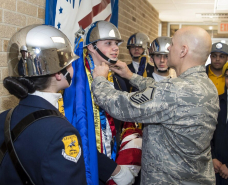The geography of military recruitment

Military recruitment tactics are increasingly fine-tuned to where a person lives, and how they perceive the world’s geography
‘The basic argument is that military recruitment has a geography. It happens in certain places, and maps on to broader trends in society – particularly inequality,’ says Matthew Rech, a researcher at Newcastle University who specialises in geopolitics and military recruitment.
‘There’s also an imagined geography to military recruitment. The military has to persuade people of a particular vision or version of the world, which is based on assumptions of cultural difference and otherness,’ says Rech.
Different services present the world in different ways. ‘The Royal Air Force, for instance, is distinct. It promises world travel. There’s also an idea bound up in the theatre and romance of flight. The pilot is a transcendent person,’ he says.
Rech compares the US recruitment process to the approach in the UK, which he sees as much less intense. In the US, the No Child Left Behind Act – a Federal funding package – requires state-funded schools to release personal pupil data to the military or forfeit Federal funding. Anti-war organisations in the US encourage pupils to opt out from sharing this information with the military. They do simple things like flyering outside the gates of schools – or culture jamming, where they deface recruitment materials.
‘In the UK, counter-recruitment is based on a very specific reaction to the local culture,’ says Rech. He points to Darren Cullen, a UK artist, who has been prominent in subverting recruitment messages from the military, as a notable example. ‘Recruitment is much less advanced in the UK because the US has a heightened culture of military recruitment. In the UK, recruitment is growing more sophisticated, but it is less visible than in the US.’
“In the US, the No Child Left Behind Act – a Federal funding package – requires state-funded schools to release personal pupil data to the military or forfeit Federal funding”
Privatisation of the UK recruitment process has led to changes in how messages are conveyed to the UK public. The Central Office of Information used to handle all the contracts, but this has been abolished. ‘There is a new financial context in how this happening,’ says Rech. The armed services are bringing new advertising agencies on board, and these agencies try out new techniques. ‘The UK military has been quite slow on social media. Now the military has developed Twitter accounts for individual service personnel to encourage recruitment, along with videos.’
While the centralised message might be changing, Rech points out that there’s still a strong local geography to military recruitment: ‘There is a central budget for recruiting that provides messages on television and in magazines, but each individual regiment in the Army, for example, has its own recruitment budget. This manifests itself as a recruiting presence at things like a local country fair.’ These methods tend to be in keeping with the local area’s traditions, and how locals see the wider world.
Source: geographical.co.uk
Countering Military Recruitment

WRI's new booklet, Countering Military Recruitment: Learning the lessons of counter-recruitment campaigns internationally, is out now. The booklet includes examples of campaigning against youth militarisation across different countries with the contribution of grassroot activists.
You can order a paperback version here.








